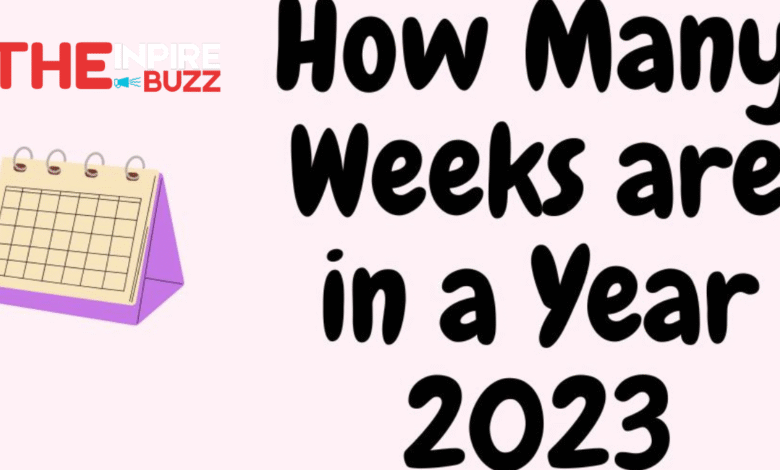How Many Weeks in a Year and Why It Matters

When we break down a year, most people immediately think of months and days. But if you stop and calculate how many weeks in a year, the perspective shifts. It makes time feel more approachable and easier to organize. For example, dividing your annual goals into weekly milestones often feels less overwhelming than staring at a whole year ahead.
This matters because weeks are how most of us live our routines. Paychecks often arrive weekly or biweekly, lessons at school are scheduled week by week, and even TV shows used to be released weekly before streaming took over. That natural rhythm is why the question of how many weeks in a year resonates with people across different walks of life.
How Many Weeks in a Year and the Calendar Connection
The idea of how many weeks in a year is closely tied to the calendar system we use. Most of the world follows the Gregorian calendar, which is divided into months, days, and of course, weeks. Each week contains seven days, and when those days multiply across the months, we arrive at a total count that helps explain the yearly structure.
Calendars have been used for thousands of years to guide farming, religious rituals, and social events. By understanding the relationship between days, weeks, and months, people could predict seasons and plan ahead. So, when you think about how many weeks in a year, it’s not just a math question—it’s a reflection of human history and the way we organize life itself.
How Many Weeks in a Year from a Practical Perspective
If you think about it practically, knowing how many weeks in a year makes planning much easier. Businesses often plan quarters, but when those quarters are broken into weeks, teams can set smaller goals, track performance, and celebrate progress more frequently. It’s the same for personal routines like budgeting or meal prepping—weeks become the perfect unit of time to manage life.
Sports seasons, fitness programs, and even school curricula are often divided into weeks because they provide enough time for progress without feeling too long. That’s why the question of how many weeks in a year is more useful than it first appears. It provides a tool to make time tangible and manageable in everyday situations.
Why People Ask About Weeks Instead of Days
It may seem curious that people wonder about how many weeks in a year rather than how many days. The reason is simple: weeks feel human-sized. A day is too short to plan for big tasks, and a month sometimes feels too long to track immediate progress. A week strikes the right balance—it allows flexibility, but it’s also structured enough to keep things on track.
Think about your own life: work schedules, fitness plans, and even vacations often revolve around weeks. That’s why the question resonates. It’s less about curiosity and more about finding a practical way to make sense of time. Weeks are like stepping stones that make the path through a year easier to walk.
Cultural Views on Measuring Weeks
Different cultures have their own ways of looking at time, and while the seven-day week is widely used, it hasn’t always been universal. Some ancient civilizations experimented with different week lengths, but the system we know today became dominant because of religious traditions and historical influences. This shows that the way we think about how many weeks in a year is tied to culture as much as math.
Even now, certain traditions mark time differently, but the global nature of business, technology, and travel has made the seven-day week a common language. So, when we ask how many weeks in a year, we’re really talking about a global standard that connects people around the world.
How Weeks Influence Daily Life
Weeks have a bigger impact on life than most people realize. Work-life balance often depends on weekends, which fall neatly within the weekly structure. Schools, jobs, and even personal projects are typically broken into weekly schedules, making weeks the natural rhythm of modern life. Understanding how many weeks in a year helps put these rhythms into perspective.
The beauty of the weekly cycle is its repetition. Knowing you have a fresh start every week gives people the motivation to reset, improve, and move forward. That’s why calculating how many weeks in a year isn’t just academic—it’s motivational and deeply practical.
Weeks, Goals, and Personal Growth

For personal growth, breaking time into weeks is incredibly powerful. If you’ve ever tried setting yearly resolutions, you know how overwhelming they can feel. But when you reframe them into weekly actions, they suddenly seem achievable. That’s where understanding how many weeks in a year becomes more than trivia—it becomes a tool for progress.
Whether it’s reading a book a week, saving a little money each week, or committing to a new habit, those weekly milestones add up. By the end of the year, you’ve created meaningful results without the stress of tackling everything at once.
The Role of Leap Years
Leap years add a twist to the conversation about weeks. Every few years, we gain an extra day in February to keep our calendar aligned with the Earth’s orbit. This small adjustment doesn’t dramatically change how many weeks in a year, but it’s a reminder that timekeeping isn’t as straightforward as it seems.
That extra day shows us how flexible our calendar really is. It’s a small shift that ensures our seasons stay consistent year after year. So, when thinking about how many weeks in a year, leap years remind us that even our most trusted systems need a little fine-tuning.
The Psychology of Weekly Timeframes
Psychologists often point out that weekly cycles are deeply ingrained in our minds. People naturally use weeks to measure effort, rest, and reward. That’s why understanding how many weeks in a year isn’t just about calculation—it’s about tapping into how humans process time.
This perspective is useful in many areas of life. For example, therapy, coaching, or education often uses weekly check-ins because they’re long enough to show progress but short enough to keep motivation alive. Weeks feel like the perfect balance between structure and flexibility.
Conclusion
So, when someone asks how many weeks in a year, it’s more than just a math problem. It’s about how humans understand and use time in daily life. Weeks give structure, rhythm, and a sense of balance to our routines. They guide our work, shape our goals, and even influence our psychology.




